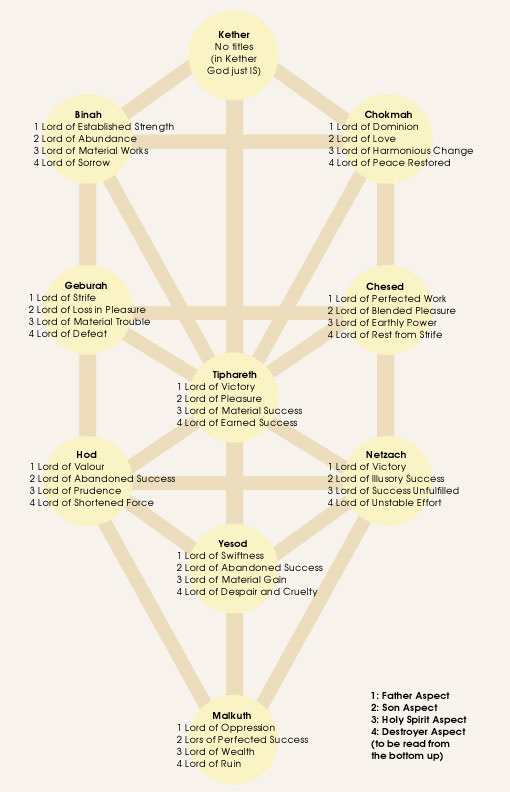
Joumana Medlej
The Qabalistic Tree of Life is aptly called a map, since like a map it grants us a bird's eye view of a situation that we are normally too involved with to make out. Yet it would be even more accurate to call it a diagram, since it is not content with reproducing reality on a smaller scale: it sharpens borders that are in truth blurry, making the newly defined elements more visible for study. It makes the relationships between these elements immediately evident thanks to a simultaneous, visual format as opposed to a linear, verbal one. In sum, it is more a mental construct than a icon (as a map is).
The implications of this are deep. As a theosophical construct, the Tree of Life is not limited to a single body of lore. If it ever was, it has now outgrown it to become a template on which any manner of theological thought can project its symbols for contemplative purposes. The Christians themselves have been using it esoterically since the 13th century.
Gareth Knightís analysis of the Tree, and of the Tarot in the light of it, reveals a fascinating table mapping out the Four Aspects of God. The Tarot in this case serves as the connecting diagram that explains how the Tree of Life can lead to a better intellectual understanding of God.

The Tree of Life as you see it in this diagram is one, but it is also quadruple for it has four simultaneous dimensions called "worlds":
The Four Worlds are aligned respectively with the esoteric Christian notion of the Four Aspects of God:
These four aspects exist superimposed as mentioned above, but can also be broken down from top to bottom as Spirit descends the Tree: first Kether (the Source), then Chokmah and Binah (stabilization), then Khesed to Yesod (slow preparation to incarnation) and finally Malkuth (matter).
Now Tarot cards have assigned places on the Tree of Life, and when one remembers that there are 4 suits and 10 number cards, one starts to see the correlation with the Four Worlds and the Ten Spheres. Indeed Fire, Water, Earth and Air correspond to the Worlds as well, respectively. On a vertical scale the cardsí numbers are aligned with the Spheres (Aces for Kether, Tens for Malkuth and the rest in between), thus providing a system that maps out each of the four Aspects of God at each of the 10 steps of the descent down the tree -- for instance, the manifestation of the Son in Binah or that of the Destroyer in Yesod. As a matter of fact, each numbered card of the Lesser Arcana bears a title symbolizing its place.
The deeper implications of these titles are admirably explained in Gareth Knightís Practical Guide to Qabalistic Symbolism (chapter: The Lesser Arcana), and neednít be laid out here in full. For personal meditation purposes however, I provide here a diagram of the titles as they are positioned on the Tree through the cards. In order to have a more complete view of the system, try laying out the cards themselves along with the titles.
Bibliography:
Diagram and article by Joumana Medlej (©)
I was born in 1979 in Beirut, Lebanon, and am graduating next month in the Design major of the American University of Beirut. I was raised in "practical" Christianity and developed a taste for the Occult early on. The Tarot and the Qabalah are my pet occult subjects.
|
Webpage and content Copyright©2002 Gnostic Cross Magazine. |